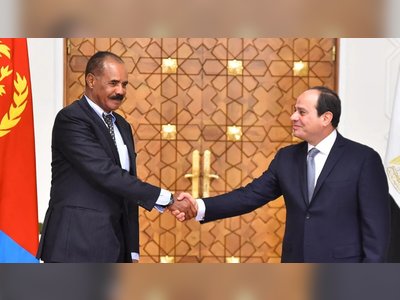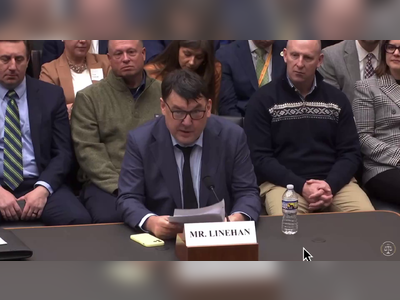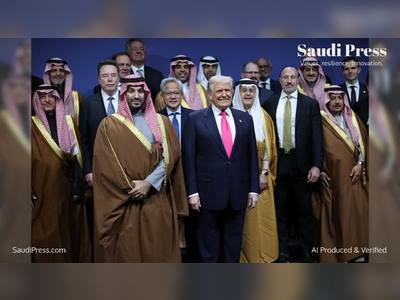
WTO ministers reach deals on fisheries, food, COVID vaccines
After all-night talks, members of the World Trade Organization early Friday reached a string of deals and commitments aimed at protecting stocks of ocean fish, broadening production of COVID-19 vaccines in the developing world, improving food security and reforming a 27-year-old trade body that has been back on its heels in recent years.
WTO Director-General Nzogi Okonjo-Iweala, after a pair of sleepless nights in rugged negotiations, concluded the WTO’s first ministerial conference in 4-1/2 years by trumpeting a new sense of cooperation at a time when the world faces crises like Russia’s war in Ukraine and a once-in-a-century pandemic that has taken millions of lives.
“The package agreements you have reached will make a difference to the lives of people around the world,” said Okonjo-Iweala, landing what she called an “unprecedented package of deliverables” after 15 months in the job. “The outcomes demonstrate that the WTO is in fact capable of responding to emergencies of our time.”
There were tears of joy and hugs exchanged, applause echoed through the WTO’s concrete halls and many ministers broke out into renditions of “Happy Birthday” to celebrate belatedly the Monday birthdays of Okonjo-Iweala and Indian Commerce Minister Piyush Goyal after the deals were finalized.
The agreements could breathe new life into a trade body that faced repeated criticism from the administration of former U.S. President Donald Trump, which accused the WTO of a lack of fairness to the United States, and was caught in a growing U.S. rivalry with China. In recent years, Washington has incapacitated the WTO’s version of an appeals court that rules on international trade disputes.
The WTO operates by consensus, meaning that all its 164 members must agree on its deals — or at least not get in the way. The talks at times took place in backrooms or in side chats because some delegates didn’t want to be in the same space as their counterparts from Russia — as a way to protest President Vladimir Putin’s invasion of Ukraine, which has had fallout far beyond the battlefield, such as on food and fuel prices.
Among the main achievements Friday was an accord, which fell short of early ambitions, to prohibit both support for illegal, unreported and unregulated fishing and for fishing in overtaxed stocks in the world’s oceans. It marked the WTO’s first significant deal since one in 2013 that cut red tape on treatment of goods crossing borders — and arguably one of its most impactful.
“WTO members have for the first time, concluded an agreement with environmental sustainability at its heart,” Okonjo-Iweala said. “This is also about the livelihoods of the 260 million people who depend directly or indirectly on marine fisheries.”
She said the deal takes a first step to curb government subsidies and overcapacity — too many operators — in the fishing industry. But India and some allies won concessions that scrapped an entire chapter from a proposal that could have threatened some types of subsidies favoring small-scale, artisanal fishing.
The fisheries agreement, which focused on subsidies for types of fishing that are unsustainable or illegal, came with a late addition that will limit its validity to four years unless new rules to fight overcapacity and overfishing are addressed. That was a clause sought by some African, Caribbean and Pacific Island countries.
More controversial was an agreement on a watered-down plan to waive intellectual property protections for COVID-19 vaccines, which ran afoul of advocacy groups that say it did not go far enough — and could even do more harm than good.
But Okonjo-Iweala said the waiver of intellectual property protections “will contribute to ongoing efforts to concentrate and diversify vaccine manufacturing capacity so that a crisis in one region does not leave others cut off.”
U.S. Trade Representative Katherine Tai hailed a “concrete and meaningful outcome to get more safe and effective vaccines to those who need it most.”
Her announcement a year ago that the U.S. would break with many other developed countries with strong pharmaceutical industries to work toward a waiver of WTO rules on COVID-19 vaccines served as an impetus to talks around a broader waiver sought by India and South Africa.
But some advocacy groups were seething. Aid group Doctors Without Borders called it a “devastating global failure for people’s health worldwide” that the agreement stopped short of including other tools to fight COVID-19, including treatments and tests.
“The conduct of rich countries at the WTO has been utterly shameful,” said Max Lawson, co-chair of the People’s Vaccine Alliance and head of inequality policy at Oxfam.
He said the European Union, United States, Britain and Switzerland blocked a stronger text.
“This so-called compromise largely reiterates developing countries’ existing rights to override patents in certain circumstances,” Lawson said.
Big pharmaceutical companies weren’t happy that the vaccine waiver was approved, arguing that it sends a negative message to researchers and innovators who developed COVID-19 vaccines with blistering speed.
“The decision is a disservice to the scientists that left no stone unturned and undermines manufacturing partnerships on every continent,” said Thomas Cueni, director-general of the International Federation of Pharmaceutical Manufacturers and Associations.
Goyal, the Indian minister whose tough negotiating stance had frustrated some developed countries, said the ministerial meeting was a “big boost for multilateralism” and showed progress on issues — like fisheries — that have been lagging for decades.
“India is 100% satisfied with the outcome,” he told reporters in Geneva. “I am not returning to India with any worries.”
Ministers also agreed to avoid imposing some export restrictions that have weighed on the U.N.’s World Food Program, which is trying to offset the impact of rising food prices and fallout from the war in Ukraine on shipments of wheat, barely and other food staples from the key producing country.
“The package agreements you have reached will make a difference to the lives of people around the world,” said Okonjo-Iweala, landing what she called an “unprecedented package of deliverables” after 15 months in the job. “The outcomes demonstrate that the WTO is in fact capable of responding to emergencies of our time.”
There were tears of joy and hugs exchanged, applause echoed through the WTO’s concrete halls and many ministers broke out into renditions of “Happy Birthday” to celebrate belatedly the Monday birthdays of Okonjo-Iweala and Indian Commerce Minister Piyush Goyal after the deals were finalized.
The agreements could breathe new life into a trade body that faced repeated criticism from the administration of former U.S. President Donald Trump, which accused the WTO of a lack of fairness to the United States, and was caught in a growing U.S. rivalry with China. In recent years, Washington has incapacitated the WTO’s version of an appeals court that rules on international trade disputes.
The WTO operates by consensus, meaning that all its 164 members must agree on its deals — or at least not get in the way. The talks at times took place in backrooms or in side chats because some delegates didn’t want to be in the same space as their counterparts from Russia — as a way to protest President Vladimir Putin’s invasion of Ukraine, which has had fallout far beyond the battlefield, such as on food and fuel prices.
Among the main achievements Friday was an accord, which fell short of early ambitions, to prohibit both support for illegal, unreported and unregulated fishing and for fishing in overtaxed stocks in the world’s oceans. It marked the WTO’s first significant deal since one in 2013 that cut red tape on treatment of goods crossing borders — and arguably one of its most impactful.
“WTO members have for the first time, concluded an agreement with environmental sustainability at its heart,” Okonjo-Iweala said. “This is also about the livelihoods of the 260 million people who depend directly or indirectly on marine fisheries.”
She said the deal takes a first step to curb government subsidies and overcapacity — too many operators — in the fishing industry. But India and some allies won concessions that scrapped an entire chapter from a proposal that could have threatened some types of subsidies favoring small-scale, artisanal fishing.
The fisheries agreement, which focused on subsidies for types of fishing that are unsustainable or illegal, came with a late addition that will limit its validity to four years unless new rules to fight overcapacity and overfishing are addressed. That was a clause sought by some African, Caribbean and Pacific Island countries.
More controversial was an agreement on a watered-down plan to waive intellectual property protections for COVID-19 vaccines, which ran afoul of advocacy groups that say it did not go far enough — and could even do more harm than good.
But Okonjo-Iweala said the waiver of intellectual property protections “will contribute to ongoing efforts to concentrate and diversify vaccine manufacturing capacity so that a crisis in one region does not leave others cut off.”
U.S. Trade Representative Katherine Tai hailed a “concrete and meaningful outcome to get more safe and effective vaccines to those who need it most.”
Her announcement a year ago that the U.S. would break with many other developed countries with strong pharmaceutical industries to work toward a waiver of WTO rules on COVID-19 vaccines served as an impetus to talks around a broader waiver sought by India and South Africa.
But some advocacy groups were seething. Aid group Doctors Without Borders called it a “devastating global failure for people’s health worldwide” that the agreement stopped short of including other tools to fight COVID-19, including treatments and tests.
“The conduct of rich countries at the WTO has been utterly shameful,” said Max Lawson, co-chair of the People’s Vaccine Alliance and head of inequality policy at Oxfam.
He said the European Union, United States, Britain and Switzerland blocked a stronger text.
“This so-called compromise largely reiterates developing countries’ existing rights to override patents in certain circumstances,” Lawson said.
Big pharmaceutical companies weren’t happy that the vaccine waiver was approved, arguing that it sends a negative message to researchers and innovators who developed COVID-19 vaccines with blistering speed.
“The decision is a disservice to the scientists that left no stone unturned and undermines manufacturing partnerships on every continent,” said Thomas Cueni, director-general of the International Federation of Pharmaceutical Manufacturers and Associations.
Goyal, the Indian minister whose tough negotiating stance had frustrated some developed countries, said the ministerial meeting was a “big boost for multilateralism” and showed progress on issues — like fisheries — that have been lagging for decades.
“India is 100% satisfied with the outcome,” he told reporters in Geneva. “I am not returning to India with any worries.”
Ministers also agreed to avoid imposing some export restrictions that have weighed on the U.N.’s World Food Program, which is trying to offset the impact of rising food prices and fallout from the war in Ukraine on shipments of wheat, barely and other food staples from the key producing country.











